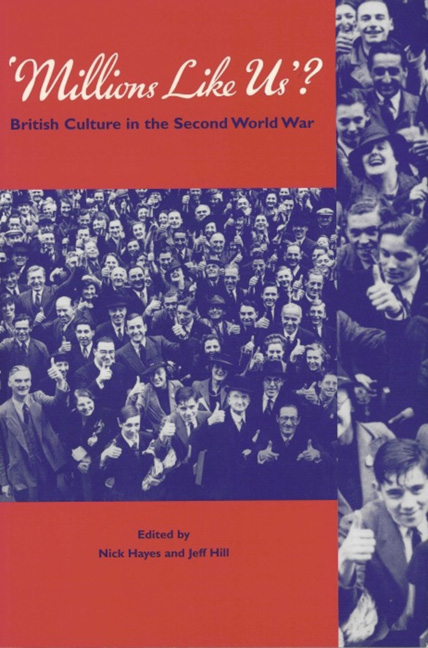Book contents
- Frontmatter
- Contents
- List of Figures and Tables
- Notes on Contributors
- Acknowledgements
- An ‘English War’, Wartime Culture and ‘Millions Like Us’
- British Cinema and ‘The People's War’
- The People's Radio: The BBC and its Audience, 1939–1945
- Was it the Mirror Wot Won it? The Development of the Tabloid Press During the Second World War
- A More Even Playing Field? Sport During and After the War
- A Time for Hard Writers: The Impact of War on Women Writers
- Safe and Sound: New Music in Wartime Britain
- More Than ‘Music-While-You-Eat’? Factory and Hostel Concerts, ‘Good Culture’ and the Workers
- ‘When Work Is Over’: Labour, Leisure and Culture in Wartime Britain
- Not Just a Case of Baths, Canteens and Rehabilitation Centres: The Second World War and the Recreational Provision of the Miners’ Welfare Commission in Coalmining Communities
- ‘You and I – All of Us Ordinary People’: Renegotiating ‘Britishness’ in Wartime
- Postscript: A War Imagined
- Index
Postscript: A War Imagined
- Frontmatter
- Contents
- List of Figures and Tables
- Notes on Contributors
- Acknowledgements
- An ‘English War’, Wartime Culture and ‘Millions Like Us’
- British Cinema and ‘The People's War’
- The People's Radio: The BBC and its Audience, 1939–1945
- Was it the Mirror Wot Won it? The Development of the Tabloid Press During the Second World War
- A More Even Playing Field? Sport During and After the War
- A Time for Hard Writers: The Impact of War on Women Writers
- Safe and Sound: New Music in Wartime Britain
- More Than ‘Music-While-You-Eat’? Factory and Hostel Concerts, ‘Good Culture’ and the Workers
- ‘When Work Is Over’: Labour, Leisure and Culture in Wartime Britain
- Not Just a Case of Baths, Canteens and Rehabilitation Centres: The Second World War and the Recreational Provision of the Miners’ Welfare Commission in Coalmining Communities
- ‘You and I – All of Us Ordinary People’: Renegotiating ‘Britishness’ in Wartime
- Postscript: A War Imagined
- Index
Summary
It is now something of a commonplace to remark, as E. H. Carr originally did, that history is ‘an unending dialogue between the present and the past’. But in this particular book we might be forgiven for repeating Carr's observation. Though there are ample academic reasons justifying a study of wartime cultural production, many of them alluded to by Nick Hayes in the Introduction, there is also a special British fascination with the war to be accounted for. More than 50 years after its conclusion, the war continues to engage the minds of British people. So much so that we might conceive of the impact of the war on late twentieth-century British life in terms comparable to that of the Revolution on the French in the nineteenth century: an event which shaped, perhaps even convulsed, the thoughts and actions of those who lived many years afterwards, whose lives were set in the shadow of the event and the ideas it generated. By contrast the French, and continental Europeans generally, have reacted differently to the Second World War. It has, overtly at least, been less of a national obsession, and its cultural legacy has been borne more lightly. For the British memories of the war occupy a key function in creating a sense of nation. The war has taken its place alongside the winning of the football World Cup in 1966 as the two most recent versions of ‘their finest hour’.
This contrast in popular memories was neatly encapsulated in an episode of the BBC comedy programme Fawlty Towers in the 1970s. Following a particularly indelicate exchange with some German guests in his fictional Torquay hotel, the egregious Basil Fawlty warned his staff: ‘don't mention the war; I did, but I think I got away with it’. What his guests were desperate to forget Fawlty was only too prone to recall. Many have shared Fawlty's inability to forget. Historians in particular have never been diffident about mentioning the Second World War. Indeed, it has provided many of them with a decent living (and to that extent they have perhaps ‘got away with it’).
- Type
- Chapter
- Information
- Millions Like Us?British Culture in the Second World War, pp. 323 - 335Publisher: Liverpool University PressPrint publication year: 1999

